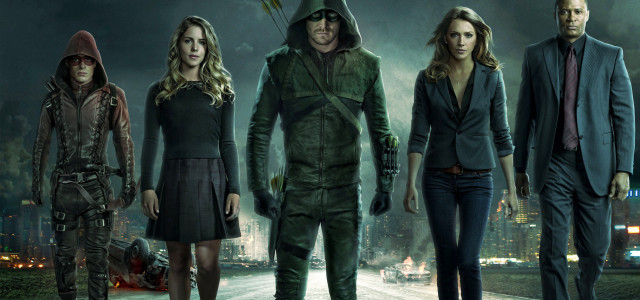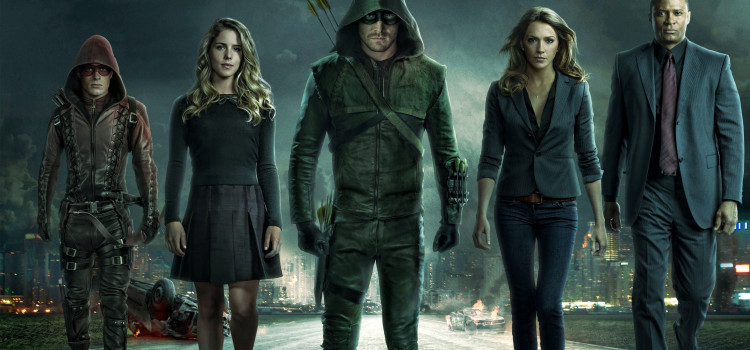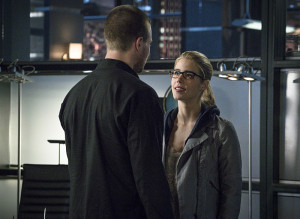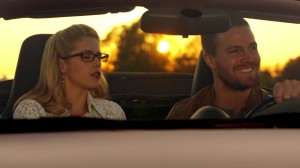

Team GATV Roundtable: Looking Back At Season 3
Opinion September 15, 2015 Craig Byrne

 Is “Olicity” a good thing or a bad thing at this point in the series?
Is “Olicity” a good thing or a bad thing at this point in the series?
STEPHANIE: Both. It was bound to happen, so it might as well have happened sooner rather than later when they’ve spent too much time dragging it out like most series do. But, we spent two seasons loving Felicity for characteristics that are no longer present because of her feelings for Oliver.
DEREK: This is a complicated question, because I don’t think you can really judge an element like that as wholly “good” or “bad.” Diggle hastily getting back together with his ex-wife after breaking up with his long term love interest offscreen sounds really terrible on paper, but his relationship with Lyla ended up being the most enjoyable and healthiest relationship on the show. The trick is how it’s executed, and when it comes to romance when the core of the story is about something other than romance, it’s extra important that the romance be treated organically. And I do think, in retrospect, the flirtation between Oliver and Felicity in the first two seasons made sense. In “Unthinkable,” they acknowledged the feelings but begrudgingly accepted that it would be ridiculous to pursue them in the current climate. I could have seen a version of season 3 where they’re steadily testing the waters, maybe breaking up midseason, exploring other avenues, and then at the end getting together after growing as as people better-suited for a healthy relationship (especially the paradigm of “damaged” that is Oliver Queen.) That’s sort of what season 3 tried to do in broad strokes. But it cut its own self off at the knees when “The Calm” supersped past all that, as it threw the two together headlong and broke them up in less than 40 minutes.
The rest of the season had the ambiguity and maturity replaced with really cliche “It’s true epic destined forever love but we can never be together.” We even got that awkward Felicity flashback in “The Return” just to prove that it was so fated, you guys. So the result is a season where they’re both pining over each other season 2-style, except with a lot of grating frustration and anger — Felicity mad that Oliver ended it without her input and Oliver jealous when Felicity gets another boyfriend — and it just plays like a painfully overwritten, high school-esque “love story,” which the show had managed to avoid up until then. The finale took the naive-but-pervasive “everything is solved as long as we’re in love” approach, which is just not very good writing and doesn’t fit into the groundedness Arrow was built on. And I could even deal with all of that if it seemed organic to the characters, but it resulted in a season of unfairly flattening Felicity into being driven by nothing but her love for and angst over Oliver, a common side-effect of those types of love stories. So the way it’s been written, no, I’m not a fan, and I find it very problematic.
CRAIG: I’m mixed. I thought the pairing was handled very well, for the most part, in the first two seasons of the show, but it seemed like they went from “hey they kind of like each other” to “ridiculously in love” overnight…. and then drama was mixed in, which took away one of the fun parts of the show that was actually *working.*
I know the Arrow producers have claimed there isn’t shipper-pandering going on here, but there are things like the Felicity cameo in “The Return” that just seemed to be thrown in to excite those folks. A trip to Nanda Parbat didn’t need to include sex and candles, though I know a lot of people did love that…. and the season didn’t need to end where it did.
There are some who might think I say this because I’m a die-hard “Lauriver” or something… no. I’m all for Green Arrow/Black Canary crimefighting duo, but I think their chances for romance have most likely sailed. I just hope, moving forward, the show is more about the heroic journey and not just about Olicity, because there’s so much more to the show than who Oliver Queen chooses to romance, and at this point, Oliver is still not in the right place to be romantic with anybody. Ask me this again after he’s mellowed out and hasn’t just manipulated his friends for a few months.
LAUREL: Olicity is a double-edged sword for Arrow. Oliver and Felicity are a good couple when they’re allowed to act naturally and not have romantic longing or abrupt “Let’s not be heroes anymore” things. I’m interested to see how it’s handled going forward — if they can have a relationship a little more like Diggle and Lyla, it could be good. You know, just being accepting of the other person’s desire and aptitude when it comes to saving the world and getting on with it.
 MATT: Ah, I’m hesitant to even talk about the Oliver and Felicity pairing because I’m just flat burnt out on hearing about it. However, it became such a focus of Season 3 that you can’t not talk about it. I’ve mentioned before that I’m not a fan of the pairing. It’s not that I have any problem with romance in superhero stories; I’m a huge romantic. I think romance is an essential part of the human experience and that kind of relationship is an important one to explore in live-action superhero stories, particularly long-form ones like Arrow. There needs to be a balance, though, and I’ve found that the relationship stuff became far too heavy in Season 3. That imbalance would be more forgivable if the relationship felt far more organic, and more importantly, if it didn’t alter the characters for the worse.
MATT: Ah, I’m hesitant to even talk about the Oliver and Felicity pairing because I’m just flat burnt out on hearing about it. However, it became such a focus of Season 3 that you can’t not talk about it. I’ve mentioned before that I’m not a fan of the pairing. It’s not that I have any problem with romance in superhero stories; I’m a huge romantic. I think romance is an essential part of the human experience and that kind of relationship is an important one to explore in live-action superhero stories, particularly long-form ones like Arrow. There needs to be a balance, though, and I’ve found that the relationship stuff became far too heavy in Season 3. That imbalance would be more forgivable if the relationship felt far more organic, and more importantly, if it didn’t alter the characters for the worse.
In specific, Felicity became the worst version of herself in Season 3, continuing a trend that actually started last year. Her entire existence became about Oliver’s love, and it’s stunning to me that others can find that appealing. We’ve been accused of being misogynstic here at GATV because we dare to speak out about any dislike of the direction they’ve taken Felicity or the relationship as a whole. Yet, I can’t help but think the idea that all Felicity is good for is to be Oliver’s love interest, that she would even compromise her ideals as relates to serving the greater good just for her man, should have people up in arms. What’s worse is it gave Emily Bett Rickards, a long-time favorite of the site, very limited things to do last year, primarily leaving her crying most of the year. It’s something Emily herself grew tired of and wants to see changed in Season 4. Felicity deserves more than just being a love interest.
As does Oliver. There should’ve been more layers to his desire to have a life outside of herodom, and his focus purely on having an intimate relationship made for some silly and often times boneheaded decisions in Season 3. In a way, that fits this version of Oliver Queen, who makes as many mistakes as he succeeds on the series, but it too often felt unearned throughout the year. Coupled with the uncertainty in how to really approach the questions of identity in the season, Stephen Amell didn’t feel any less committed but didn’t seem quite as interested in what was going on. I wasn’t a fan of the actual drive off into the sunset, but one thing I do like about the ending of the finale is the chance to restart the series with a changed Oliver. The possibilities of that are nice. Maybe they’ve found better ways to tell the Olicity story, but I’m not looking forward to it if it continues to detract from the two characters as individuals.
Come back later this week as we look forward to Season 4 with the rest of our roundtable! Thanks for reading all of Part 1!














